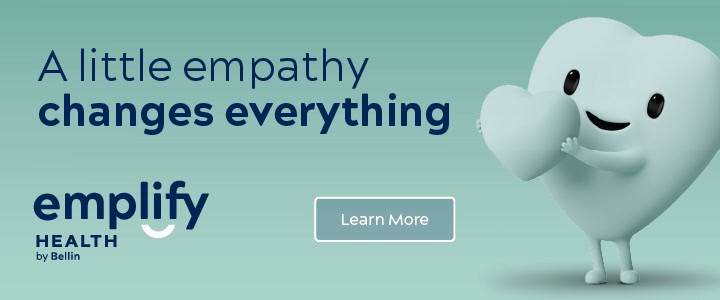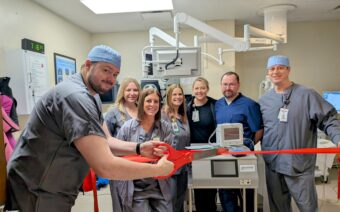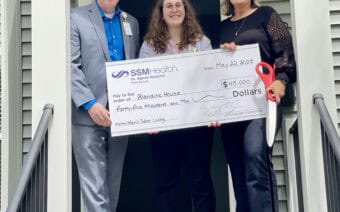
October 20, 2023
GREEN BAY – Cell phones, other hand-held devices, gaming systems and social media have become a common part of today’s society.
“The question is – are you using technology the way it’s intended and setting boundaries, or is the technology controlling your life?’” Chaz Johnson with the Bellin Psychiatric Center said. “I see patients every day, and that’s a question I ask many.”
To learn more about the benefits and downfalls of technology, and how it relates to one’s mental health, Bellin Health and the Green Bay Packers presented a new free community event earlier this month called, “The Mental Health Film Room.”
The event featured a screening of the film “LIKE – Are you using technology or is it using you?” followed by a discussion with a panel of Bellin Health and Green Bay Packers experts – which included former Packers running back Patrick Taylor.
“The film does a good job of showing where we started and where we’re at in terms of social media, and ‘Oh, this is a cool thing,’ but now we’re asking, ‘Are there some negative things that have come along with the positive?’” Johnson said.
Danger, danger
As with many new pieces of technology, Johnson said you have to weigh the positives with the negatives.
“We’re seeing issues in a younger population,” he said. “And even adults – it messes with a person’s self-esteem, almost like an addiction. Every five to 10 years, the CDC (Centers for Disease Control and Prevention) surveys eighth graders asking them things about depression, addiction, anxiety, substance abuse, sexual intercourse, etc. The surveys have shown drug use and abuse are down, but depression and anxiety have increased.”
For teen females, the most recent survey showed suicidal thoughts within the last month increased by 30%, Johnson said.
“Maybe some of it’s still from the COVID-19 pandemic, but now we’re seeing issues with the pressures of social media,” he said.
Johnson said over the years, his own personal survey questions he asks patients have also changed.
“It used to be, ‘Do you smoke cigarettes, drink alcohol, have depression or suicidal thoughts?’ and now it’s ‘How much time do you spend on social media?’” he said. “For some of that, if you’re having depression issues but spending hours and hours on your phone all day, it’s tough to feel well and have those positive social interactions – it can suck people in. People can feel alone and isolated instead of going outside for a walk. It’s all different ages, but I think for younger kids and teens, it can be more harmful.”
What can be done?
When it comes to the younger population, Johnson said families have to sit down and devise a plan.
“First off, it’s setting guidelines and limitations,” he said. “Especially with sleep, we’ve had parents look at their kid’s phone (in the morning) and tell us their kid was looking at their phone every 15 minutes. If you’re lying down and you hear that ding or vibration, you’re not fully sleeping – you’re not getting that restorative rest. Kids need 10-11 hours of sleep, and some are getting three or four. You couple that with the stresses of AP classes, etc., it can be too much. Not allowing the device in the bedroom at night is a good start.”

The film was followed by a discussion with a panel of Bellin Health and Green Bay Packers experts, including, from left, Packers Dr. Chris Carr, Bellin Psychiatric Center Dr. Tiffany Born, Packers running back Patrick Taylor, WBAY morning news anchor Aisha Morales (panel moderator) and Bellin Psychiatric Center Dr. Chaz Johnson. Submitted Photo
Why are some individuals not able to separate social media from getting quality sleep?
“It could be the fear of missing out,” Johnson said. “You also get that dopamine rush where you feel needed – especially in that 12-20 age group … who do you like, who don’t you like, what are you good at, what are you bad at? It’s feeding into that – what is my identity? This is what all my friends are doing, so should I be doing it?”
Johnson said another piece of the puzzle is how mature an individual is.
“Kids are all different in their development,” he said. “Some kids make better decisions and have more family support.”
Johnson said some apps can also help control screen time.
“I know ‘GoGuardian’ is used by schools,” he said. “You can also limit or delete some of the apps. ‘Instagram’ has one where people can post stuff just for certain people.”
Additionally, Johnson said not allowing a lock on a device is also a good step.
“Kids are savvy, and they can work around that, so parents have to stay diligent,” he said. “Parents can put time limits on a device as well.”
Before cell phones and social media, it might have been video games that were the “problem,” Johnson said.
“We still see (excessive) gaming as a problem in our younger male population – to the point where it’s a tornado or a nightmare if they’re told they have to turn it off,” he said. “I’ve talked with some kids who are gaming 12 hours per day in the summer. As a parent, do you want to put up with that hurricane every single time? That’s the tough part with parenting – sometimes it’s easier to say, ‘Okay, play your game and shut it off by 9:30.’”
Johnson said sometimes people simply get sick of their devices and say “Enough is enough.”
“I have patients who are completely off social media,” he said. “Sometimes, it clicks, sometimes it doesn’t. Sometimes, it’s about filling that void (of saying no to gaming/social media) and planning your day. That comes back to parents, mostly.”
Maybe the most important control, Johnson said, is being a good role model to your children.
“As a parent, if you’re spending all your time on your phone, your kids see that,” he said. “Limiting your own time is an effective means to decrease your kid’s time.”
Even in the NFL
Dr. Chris Carr, the Green Bay Packers director of performance psychology and team behavioral health clinician, said the problems with social media and technology do not exclusively pertain to kids and teens.
“It’s very much prevalent in professional sports,” he said. “You have agents, you have a brand, projects, commitments, things you like to do in the community – social media creates a great platform. As much as it’s a platform, it’s also an open market for criticism or downright inappropriate behavior (from fans or haters).”
During his career, Carr – who began consulting with the Packers in 2018 and 2019 and then was offered full-time in 2020 – said he has worked with athletes where social media is a big distraction.
“There are healthy ways to use social media, but professional athletes need to set boundaries,” he said. “It hasn’t happened while I’ve been in Green Bay yet, but in my work with other professional teams, some athletes just drop (social media) after a while. Their happiness level increases because they lose that comparison and that open filter of people coming through.”

Dr. Chris Carr
Carr said the 2019 NFL Collective Bargaining Agreement (CBA) mandated every team needed to have a dedicated, mental health clinician.
“The 2019 CBA indicated a shift in professional sports,” he said. “I think collegiate sports are about 10-15 years ahead in terms of their mental health offerings compared to the professional ranks.”
Before joining the Packers as a consultant, Carr was a sports and performance psychologist at Ascension St. Vincent Sports Performance in Indianapolis starting in 2006.
He also served as a consultant for multiple professional sporting organizations, including the Indiana Pacers (NBA, 2011-20), Oklahoma City Thunder (NBA, 2008-11), Kansas City Royals (MLB, 1999-2005), Arizona Cardinals (NFL, 1994-95) and others.
Carr has also worked with numerous collegiate athletic programs, including Ball State (2015-20), Butler (2015-20), Purdue (2001-07, 2013-18), Indiana (2007-13), Ohio State (1995-2000), Arizona State (1994-95) and Washington State (1992-94).
“(With the Packers), we’ve created resources so the players can be proactive in managing the stresses of the game and managing the dynamics they have to deal with because they are professional athletes,” he said.
His work with the players, Carr said, is all voluntary, and nothing is mandated.
“I’m a resource,” he said. “We have sports medicine, sports nutrition, strength and conditioning, player engagement and now we’ve added this psychology piece – it’s very progressive, and I feel fortunate to have good support from the organization.”
Carr said he’s one of only seven full-time mental health clinicians in the league.
“Everybody has somebody, but there are some teams that basically bring a person in two half days a week,” he said. “I don’t know how integrated the rest of the clinicians are, but I’m very integrated here.”
 Old Station 31 Spirits – defined by family, tradition, service
Old Station 31 Spirits – defined by family, tradition, service World Snowshoe Championships coming to Ariens Nordic Center in Brillion
World Snowshoe Championships coming to Ariens Nordic Center in Brillion








